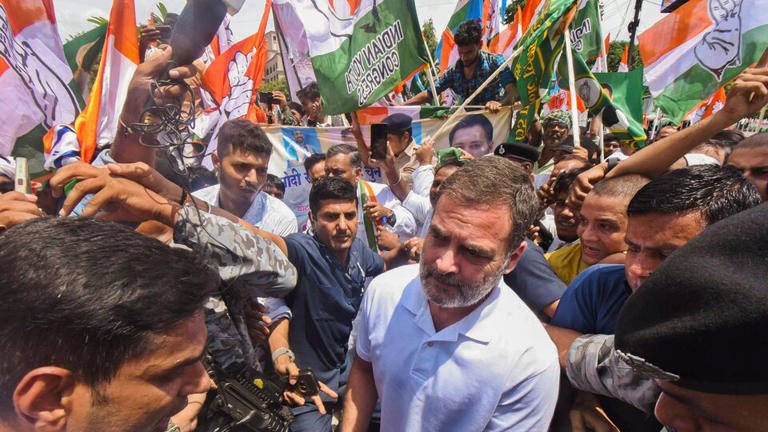Digital vs Mainstream: While TV news coverage was muted, Gandhi’s social media clips went viral, amassing millions of views within hours.
BY PC Bureau
August 9, 2025 — Two high-profile events by Leader of the Opposition Rahul Gandhi, in which he levelled stinging allegations of large-scale electoral fraud, received minimal live coverage from most mainstream television channels — a stark departure from the wall-to-wall airtime often accorded to ruling party figures.
Gandhi’s first address in Delhi was a nationally significant press conference where he presented purported evidence of manipulation in voter lists and polling in select constituencies. Less than 48 hours later, at a massive public rally in Bengaluru, he expanded on these claims, accusing the Election Commission of India (ECI) of acting in concert with the BJP to “undermine the mandate of the people.”
While the mainstream TV coverage was largely muted — with the notable exceptions of News18, News24 and a couple of others — independent online platforms and YouTube channels went into overdrive. Many popular YouTubers streamed or analysed Gandhi’s remarks in real time, with several top political commentary channels clocking over a million views each.
On social media, the traction was even higher. Rahul Gandhi’s official X (Twitter) handle had registered 7.6 million views of the Delhi press conference by this evening, while his official Facebook page’s video of the event recorded 4.7 million views. Both figures are extraordinary by any measure, signalling the public’s keen interest in hearing and understanding his message despite the lack of wall-to-wall television coverage.
#VoteChori हमारे लोकतंत्र पर Atom Bomb है। pic.twitter.com/jcLvhLPqM6
— Rahul Gandhi (@RahulGandhi) August 7, 2025
On the morning of August 8, Gandhi shared a brief summary clip of his press conference, aiming to make the key points more accessible. This clip went viral, quickly amassing nearly two million views—a clear sign of strong public appetite for his message despite the broader TV blackout.
A familiar grievance
The selective silence is not new in Gandhi’s view. Over the past few years, he has repeatedly accused large sections of the Indian media of systematically ignoring his statements and public events, while lavishing attention on even the smallest activities of BJP leaders. He has often described these outlets as being “sold out to their corporate masters” and functioning as “unofficial spokespersons” of the ruling party. His charge is that the media’s editorial choices are not accidental but part of a deliberate effort to marginalise Opposition voices.
READ: KOHUR Highlights Kuki-Zo Ordeal on Indigenous People Day
Channels accused of selective silence
Observers point out the striking contrast: the same channels have, on numerous occasions, broadcast live even minor press interactions by junior BJP spokespersons and devoted extended programming to ECI press releases — often without critical counterpoints. Instead of covering the allegations — which touched directly on the sanctity of the electoral process — many TV outlets devoted prime slots to celebrity gossip, routine political soundbites, and studio debates on unrelated issues.
Media-watch groups say the blackout is particularly troubling given the subject matter. “When the Leader of the Opposition makes specific, evidence-backed allegations about electoral malpractice, that is inherently newsworthy,” said a senior independent media analyst. “The deliberate downplaying of such events risks narrowing public discourse and weakening democratic checks and balances.”
Analysts warn that the muted coverage by mainstream channels, contrasted with the viral traction online, highlights a deepening divide in India’s information ecosystem — one where social media is becoming the primary arena for Opposition narratives that legacy TV often sidelines.
Critics argue this selective attention is not coincidental but reflects a calculated editorial bias, undermining opposition perspectives and narrowing public discourse.
Media watchers warn the silencing of opposition voices, especially on electoral integrity, poses a serious threat to democracy. This digital surge in audience attention — via YouTube, X, and other platforms — underscores how social media has become the main battleground for narratives that mainstream television either ignores or sidesteps.














